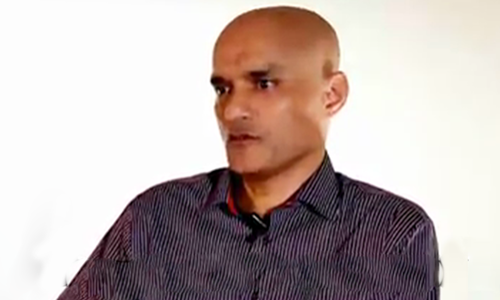ISLAMABAD: Federal Minister for Law and Justice Barrister Dr Farogh Naseem has said that the government has averted the Indian move to file a contempt petition before the International Court of Justice against Pakistan for non-compliance with the ICJ decision on Indian spy Kulbhushan Jadhav.
Addressing a press conference on Friday, he said the bill passed by the joint sitting of parliament and related to Jadhav was not person-specific rather it was a national security issue.
The parliament had passed the International Court of Justice (Review and Reconsideration) Bill, 2021 on Wednesday to provide for the right of review and reconsideration in the Jadhav case in line with the judgement of the ICJ.
“This was the red line for Pakistan. India would have gone to the ICJ and filed a contempt case against us if we have not enacted this law,” the law minister said.
Farogh says ICJ bill passed recently is not person-specific
He said that Pakistan had prevented India from filing a contempt case which was called defiance in the ICJ, adding that India could have moved the United Nations Security Council for imposing sanctions on Pakistan.
Mr Naseem criticised the opposition parties for politicising the issue and said they lacked vision to differentiate between right and wrong.
Anti-rape law
Meanwhile, parliamentary secretary for law and justice Maleeka Bukhari, who also spoke at the presser, congratulated the nation on the adoption of the landmark anti-rape legislation by the parliament.
However, she said that the proposal of chemical castration of sex offenders had been dropped in the criminal law amendments after the Council of Islamic Ideology declared it against Islamic injunctions, adding that the constitution barred any un-Islamic legislation.
She lamented the lowest conviction rate of sex offenders saying that it was about one or two per cent. Besides other issues, she explained, out of court settlement in rape cases was a major reason for the lowest conviction and higher acquittal rate. Ms Bukhari expressed hope that the new legislation would discourage out of court settlement.
She said that the law had abolished unnecessary procedures, making it simple for a rape victim to proceed against the offender.
She further said that the legislation also provided for registration of sex offenders and the National Database and Registration Authority would make arrangements for this purpose.
Published in Dawn, November 20th, 2021














































